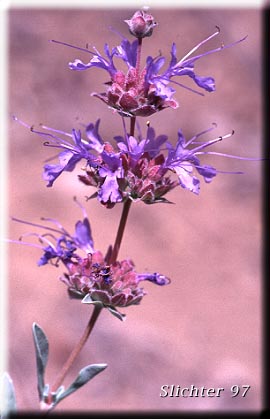 The photo at right shows the inflorescence of purple sage (var. incana)
as seen along US Highway 97 in the Yakama Indian Reservation of south-central
Washington...........June 22, 1997.
The photo at right shows the inflorescence of purple sage (var. incana)
as seen along US Highway 97 in the Yakama Indian Reservation of south-central
Washington...........June 22, 1997.
Also known as gray ball sage, purple sage is an attractive perennial, shrubby wildflower with many branched stems arising from 20-60 cm high. The rigid branches are ascending to erect and often bear a spine at their tip. Plants tend to be wider than tall. The herbage of leaves and stems consists of silvery hairs, especially on younger leaves and stems, while older growth is often more greenish and somewhat glabrous. Sessile glands may also be found on the blades and stem. The leaf blades are oblanceolate, elliptic, or spatulate in outline and measure 1-3 cm long and from 4-15 mm wide. The margins are entire the tip of the blade is usually rounded although they may also have a narrow, point at the tip. The base of the blade narrows gradually or abruptly to the petioles which range from shorter to as long as the blades. Like other mints,the leaves are opposite on the stem. The inflorescence consists of several dense, axillary clusters of flowers at the ends of the branches. Each cluster of flowers is subtended by small, leaf-like bracts which are oblong to obovate in shape, purple-tinged and ciliate margined (See photo above.). The bracts measure from 7-12 mm long and 5-10 mm wide. The calyx is funnel-shaped, up to 5 mm long, and with the lower lip with 2 rounded lobes while the upper lip is entire. The purple, blue or occasionally white corolla is 12-14 mm long. The lower lip is broad because of two divergent, long lobes. The lateral lobes are long but thin with rounded tips. The upper lip is roughly half as long as the lower lip and is divided into two erect lobes. The lower pair of fertile stamens are as long or longer than the lower lip, while the upper pair are shorter and sterile.
Like many mints, this plant is a "bee" pollinated plant.
ssp. dorii: Leaves 6-20 mm long, widest 2-13 mm from the base of the blade, the base abruptly narrowed to the petiole. The bracts and calyx are glabrous to scaly with short hairs on the margins. Found from southeastern Oregon to southwestern Idaho and south through the Great Basin in Utah to the northern Mojave Desert of California and Arizona.
ssp. dorrii variety incana (formerly carnosa): Leaf 10-40 mm long, the widest portion 6-28 mm from the base, the blade tapered gradually to the petiole. The bracts and calyx are glabrous to scaly with short, ciliate hairs on the margins. Found in the northern portion of the species' range, from Washington to Idaho and south into central Oregon and in Siskiyou County in California.
The purple sage is a plant of rocky plains, outcrops, and talus slopes.
The purple sage may be found over eastern Washington, eastern Oregon, and much of southern Idaho, Nevada, and Utah.
The photo above shows the upper stem leaves and inflorescence of an white-flowered purple sage (var. dorii) from along the Domingo Pass Road on the east side of the Pueblo Mts. of southeastern Oregon........May 27, 2004.